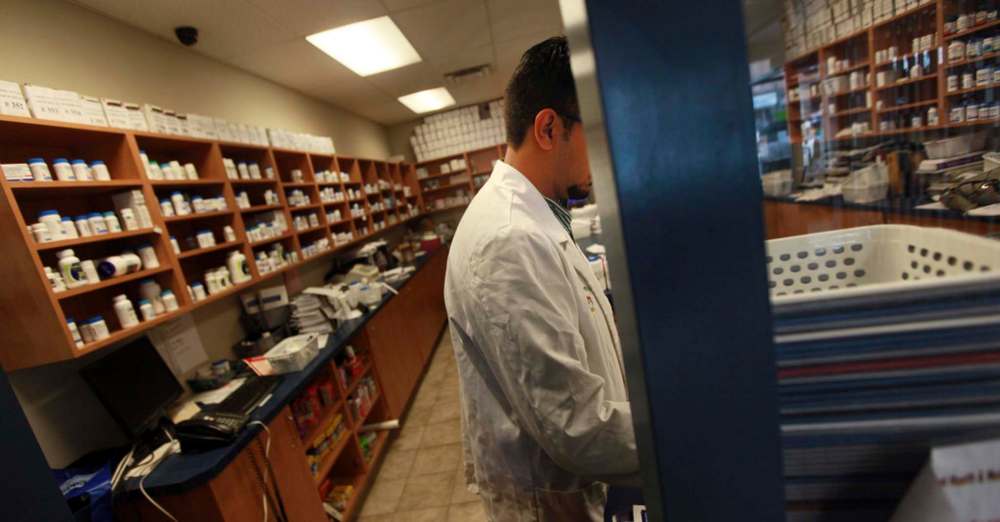Pharmacists criticized for 30-day limit on prescriptions
Advertisement
Read this article for free:
or
Already have an account? Log in here »
To continue reading, please subscribe:
Monthly Digital Subscription
$1 per week for 24 weeks*
- Enjoy unlimited reading on winnipegfreepress.com
- Read the E-Edition, our digital replica newspaper
- Access News Break, our award-winning app
- Play interactive puzzles
*Billed as $4.00 plus GST every four weeks. After 24 weeks, price increases to the regular rate of $19.95 plus GST every four weeks. Offer available to new and qualified returning subscribers only. Cancel any time.
Monthly Digital Subscription
$4.99/week*
- Enjoy unlimited reading on winnipegfreepress.com
- Read the E-Edition, our digital replica newspaper
- Access News Break, our award-winning app
- Play interactive puzzles
*Billed as $19.95 plus GST every four weeks. Cancel any time.
To continue reading, please subscribe:
Add Free Press access to your Brandon Sun subscription for only an additional
$1 for the first 4 weeks*
*Your next subscription payment will increase by $1.00 and you will be charged $16.99 plus GST for four weeks. After four weeks, your payment will increase to $23.99 plus GST every four weeks.
Read unlimited articles for free today:
or
Already have an account? Log in here »
Hey there, time traveller!
This article was published 16/04/2020 (2123 days ago), so information in it may no longer be current.
Manitoba pharmacists are defending their profession against accusations of pandemic “price gouging,” after they began selling only 30-day supplies of prescription drugs instead of the usual 90-day allotment.
Critics say pharmacies will now profit with three times the dispensing fees — and customers who pick up medications will make three times as many trips into stores amid physical-distancing orders to combat the novel coronavirus.
In March, the province accepted a recommendation from the Canadian Pharmacists Association to limit prescriptions, in an attempt to prevent people from stockpiling medication.

The decision raised concerns among medical professionals, including Dr. Milton Tenenbein, a University of Manitoba professor in the department of pharmacology and therapeutics. In an opinion column Wednesday in the Free Press, he called the move “price-gouging,” that was “foisted upon us under the mirage of altruism.”
“It’s unfair to limit the availability of all drugs because of the fear that one particular drug might become in short supply. The correct way of going about it is, when it’s identified that particular drug is in short supply, then you act specifically on that drug,” Tenenbein said in an interview Thursday.
While the Canadian Pharmacists Association has said the restriction is meant to manage supplies due to an increased demand during the pandemic, the change applies to all prescription medications.
The Free Press has received complaints from Manitobans, who say they are being triple-charged on dispensing fees. One complainant said the change particularly harms “seniors on a determined income that drops in spending power every year due to inflation.”
President of the Pharmacists Manitoba board of directors, Pawandeep Sidhu, said the group, which is a chapter of the CPhA, supports the 30-day limit, calling it “crucial to ensure the drug supply.”
She said there was already a shortage of prescription drugs pre-pandemic, and shortages beyond medications used to fight COVID-19 were possible.
“The supply chain is affected — the supply chain isn’t for one specific drug class, it’s all medications,” Sidhu said.
On Thursday, Tenenbein refuted the claim.
“There’s no evidence for that at this point in time. If there was supply chain issues, we would know about that from the government and other means,” he said.
As for the reported shortages of propofol and sedatives directly relating to COVID-19 treatment, Tenenbein said the fact it had been specifically reported on “demonstrates that the identification of shortages works, and specific mitigation strategies for that shortage have been implemented.”

Meanwhile, Sidhu said pharmacies had been “hit very hard by the pandemic” and are “doing their best to be able to support their patients.”
“I think one thing to understand is that pharmacies are not publicly funded,” she said. “A dispensing fee covers the cost of our operations overall — the overhead, the supplies, the rent, and all other things to provide a service, as well.”
Sidhu recommended any person concerned about multiple trips to have prescriptions filled should check with their local pharmacy to see if delivery is offered.
When asked for comment, the College of Pharmacists of Manitoba provided a brief statement, saying it “supports the provincial order to limit prescription refills to a one-month supply as part of its efforts to fight the COVID emergency.”
In a statement provided to the Free Press, the Canadian Pharmacists Association said it “explicitly said that patients should not have to endure any additional financial hardships as a result of this necessary measure to protect Canada’s drug supply” and “has been calling for governments and private insurers to help protect patients against any additional out-of-pocket costs resulting from more frequent refilling of chronic medications due to the temporary 30-day supply recommendations.”
malak.abas@freepress.mb.ca
Twitter: malakabas_

Malak Abas is a city reporter at the Free Press. Born and raised in Winnipeg’s North End, she led the campus paper at the University of Manitoba before joining the Free Press in 2020. Read more about Malak.
Every piece of reporting Malak produces is reviewed by an editing team before it is posted online or published in print — part of the Free Press‘s tradition, since 1872, of producing reliable independent journalism. Read more about Free Press’s history and mandate, and learn how our newsroom operates.
Our newsroom depends on a growing audience of readers to power our journalism. If you are not a paid reader, please consider becoming a subscriber.
Our newsroom depends on its audience of readers to power our journalism. Thank you for your support.
History
Updated on Thursday, April 16, 2020 7:57 PM CDT: Updates story
Updated on Friday, April 17, 2020 2:08 PM CDT: Clarifies Canadian Pharmacists Association position.


